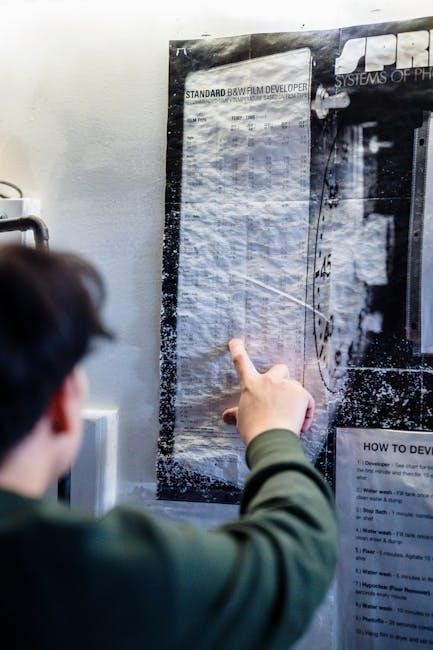Overview of Act 3 in Romeo and Juliet
Act 3 intensifies the tragic conflict, with Mercutio’s death, Romeo’s banishment, and Juliet’s forced marriage. Emotional turmoil and desperate decisions escalate, deepening the inevitable tragic outcome.
1.1. Key Events and Their Significance
The fatal duel between Mercutio and Tybalt sets off a chain of tragic events. Mercutio’s death leads to Romeo’s vengeance, resulting in Tybalt’s death and Romeo’s banishment. Juliet’s parents arrange her marriage to Paris, deepening her desperation. These events escalate the conflict, highlighting the destructive nature of hate and the inevitability of the lovers’ doomed fate.
1.2. Turning Points in the Tragedy
Mercutio’s death at Tybalt’s hand and Romeo’s subsequent vengeance mark a pivotal shift. Romeo’s banishment and Juliet’s engagement to Paris intensify the conflict. These events accelerate the tragic momentum, sealing the lovers’ fate and highlighting the irreversible consequences of impulsive actions and familial hatred, driving the story toward its devastating conclusion.
Scene 1: The Fatal Fight Between Mercutio and Tybalt
Tybalt seeks revenge against Romeo, engaging in a duel with Mercutio. Despite Romeo’s attempts to intervene, Mercutio is fatally wounded, leading to Tybalt’s death at Romeo’s hand.
2.1. Romeo’s Attempt to Stop the Duel
Romeo tries to stop Mercutio and Tybalt from fighting, reasoning that he loves Juliet and thus cannot harm Tybalt. He urges calm, but Mercutio refuses, leading to Mercutio’s death.
2.2. Mercutio’s Death and Its Impact on Romeo
Mercutio’s death fills Romeo with overwhelming grief and anger, transforming his character. Driven by vengeance, Romeo kills Tybalt, leading to his banishment. This event marks a turning point, intensifying the tragic momentum and altering Romeo’s emotional state, pushing him towards a path of destruction and inevitability.
Romeo’s Reaction and Consequences
Romeo, consumed by grief and rage, avenges Mercutio by killing Tybalt, leading to his banishment from Verona. This act plunges him into emotional turmoil and isolation.
3.1. Romeo Kills Tybalt and Flees Verona
Romeo, driven by rage and loyalty, kills Tybalt in a duel to avenge Mercutio’s death. Recognizing the consequences, Benvolio urges Romeo to flee Verona immediately. Romeo escapes, leaving behind chaos and escalating the feud between the Montagues and Capulets, while also facing banishment and emotional despair.
3.2. Romeo’s Banishment and Emotional Turmoil
Romeo, filled with despair, faces banishment from Verona after killing Tybalt. His separation from Juliet intensifies his emotional anguish, leaving him feeling hopeless and isolated. The loss of his home and loved ones deepens his tragic plight, while Juliet’s forced engagement to Paris further complicates their already desperate situation.
Scene 2: Juliet’s Anticipation of Romeo’s Visit
Juliet eagerly awaits Romeo, filled with romantic idealism and impatience. Her anticipation builds, showcasing her deep love and longing, while the tense atmosphere foreshadows impending tragedy.
4.1. Juliet’s Impatience and Romantic Idealism
Juliet’s impatience grows as she eagerly awaits Romeo, reflecting her intense romantic idealism. Her longing for union with Romeo highlights her belief in love’s transformative power, showcasing her innocence and deep emotional investment in their relationship. Her vision of Romeo in the tomb foreshadows tragedy, underscoring the tension between her hope and the ominous fate ahead.
4.2. The Nurse’s Arrival with Tragic News
The Nurse arrives with devastating news of Mercutio’s death and Romeo’s banishment, shattering Juliet’s romantic optimism. Her emotional turmoil deepens as she learns of Romeo’s fate, intensifying her isolation and desperation. The Nurse’s loyalty contrasts with the tragic reality, highlighting Juliet’s vulnerability and the irreversible consequences of the conflict between the Montagues and Capulets.
Scene 3: Romeo’s Despair and Friar Laurence’s Counsel
Romeo, overwhelmed by grief and banishment, seeks Friar Laurence’s guidance. The Friar offers counsel, providing hope and a plan to reunite the lovers.
5.1. Romeo’s Reaction to Banishment
Romeo, overwhelmed by grief and anger, reacts to his banishment with despair. He believes his life is meaningless without Juliet and contemplates death. In Friar Laurence’s cell, Romeo’s emotional turmoil peaks, expressing that the Friar cannot comprehend his pain, as he has never experienced such profound love. Romeo’s desperation reflects the depth of his emotional struggle and hopelessness.
5.2. Friar Laurence’s Plan to Reunite the Lovers
Friar Laurence devises a risky plan to reunite Romeo and Juliet. He gives Juliet a potion to make her appear dead, hoping to avoid her forced marriage to Paris. The plan aims to fake Juliet’s death, allowing her to escape to Romeo. While dangerous, the Friar believes it is the only way to preserve the lovers’ devotion and potentially reunite them in safety.

Scene 4: Lord Capulet’s Decision to Marry Juliet to Paris
Lord Capulet arranges Juliet’s marriage to Paris, seeking family alliances and honor. Juliet’s refusal sparks tension, as Capulet insists on the union, pressuring Juliet to comply.
6.1. Juliet’s Parents Announce the Marriage
Lord and Lady Capulet inform Juliet of her arranged marriage to Paris, emphasizing family honor and alliances. Juliet hesitates, expressing her dislike and reluctance, which angers her father. He insists on the marriage, expecting obedience and threatening consequences if she refuses, highlighting the societal expectations of daughters during this era.
6.2. Juliet’s Refusal and Her Father’s Anger
Juliet defies her parents by refusing to marry Paris, expressing her loyalty to Romeo. Lord Capulet, enraged by her disobedience, threatens to disown her, demanding she obey or face severe consequences. His anger highlights the societal expectations of daughters and the clash between family duty and personal desire, escalating the family conflict.

Scene 5: Juliet’s Vision of Romeo’s Death
Juliet envisions Romeo lying dead in a tomb, expressing a deep premonition of tragedy. Her emotional turmoil intensifies as she fears their love’s doomed fate, foreseeing heartbreaking separation.
7.1. Juliet’s Premonition of Tragedy
Juliet experiences a haunting vision of Romeo lying dead in a tomb, filled with dread and fear. Her intuition foretells a tragic end, heightening her anxiety about their future and the fate of their love, showcasing her deep emotional connection and foresight of the inevitable heartbreak.
7.2. Romeo’s Departure and the Lovers’ Farewell
Romeo and Juliet share a heartfelt goodbye, heavy with sorrow and uncertainty. Juliet, filled with fear, clings to Romeo, while he reassures her of their love. Their poignant farewell underscores the depth of their devotion and the impending separation, leaving both with a sense of foreboding about their future together.

Themes and Motifs in Act 3
Themes of fate, love, and hatred dominate Act 3, with violence and impulsive decisions driving the tragic progression. The motif of light and darkness symbolizes the lovers’ doomed fate, while the speed of events underscores the irreversible consequences of their choices.
8.1. Fate and Destiny
In Act 3, fate and destiny propel the tragic events forward. Juliet’s premonition of Romeo’s death and the inevitability of their separation highlight the inescapable nature of fate. The rapid sequence of Mercutio’s death, Tybalt’s slaying, and Romeo’s banishment underscores the characters’ inability to alter their doomed course, emphasizing the theme of destiny driving the play’s tragic outcome.
8.2. Love vs. Hate and Violence
Act 3 starkly contrasts love and hate, as violence escalates the conflict. Mercutio’s death and Tybalt’s vengeful actions highlight the destructive power of hatred, while Juliet’s unwavering devotion to Romeo underscores the enduring strength of love. The clash between these forces drives the tragic progression, with love becoming entangled in a cycle of violence and retribution.
Character Development in Act 3
Romeo transitions from a passionate lover to a vengeful avenger, driven by grief and anger. Juliet evolves into a determined, independent individual, defying societal expectations.
9.1. Romeo’s Transformation from Lover to Avenger
Romeo’s grief over Mercutio’s death ignites a fiery rage, transforming him from a romantic lover to a vengeful avenger. His impulsive killing of Tybalt showcases a shift from passive devotion to active fury, driven by loyalty and anguish. This change highlights his emotional depth and sets the stage for his tragic downfall, as his actions lead to banishment and isolation;
9.2. Juliet’s Growth into a Determined Individual
Juliet evolves from a naive, obedient daughter into a resolute woman, driven by her love for Romeo; Her refusal to marry Paris and her defiance of her parents showcase her growing independence. Juliet’s emotional depth and determination are evident as she faces the consequences of her choices, preparing her to take drastic measures to preserve her love and identity.

Key Quotes and Their Analysis
Act 3 features pivotal quotes like Romeo’s lament after killing Tybalt and Juliet’s haunting vision of Romeo in the tomb, highlighting tragic intensity and doomed fate.
10.1. Romeo’s Speech After Killing Tybalt
Romeo’s speech after killing Tybalt reveals his anguish and regret, as he realizes the consequences of his actions. He laments his fate, acknowledging that his banishment will separate him from Juliet. This moment underscores Romeo’s emotional turmoil and the escalating tragedy, showcasing his transformation from a lover to a figure consumed by vengeance and despair.
10.2. Juliet’s Vision of Romeo in the Tomb
Juliet envisions Romeo lying dead in a tomb, foreshadowing the tragic outcome of their love story. Her premonition filled with fear and desperation, Juliet sees Romeo lifeless, symbolizing the devastating fate that awaits them. This vision underscores the inevitability of their doom and the profound impact of their families’ feud on their lives.
Study Guide Questions for Act 3
This section offers multiple-choice and short answer questions on Act 3, focusing on plot details and thematic elements to test comprehension and analysis skills.
11.1. Multiple-Choice Questions on Plot Details
- Why does Romeo initially refuse to fight Tybalt?
- What is the immediate cause of Mercutio’s death?
- What is the consequence of Romeo killing Tybalt?
- What does Juliet envision when she asks Romeo if they will meet again?
- Who announces Juliet’s marriage to Paris, and how does she react?
These questions assess understanding of key events and their consequences in Act 3.
11.2. Short Answer Questions on Themes and Characters
- How does Romeo’s character evolve from a lover to an avenger in Act 3?
- What motivates Juliet to defy her parents regarding the Paris marriage?
- How does the theme of fate influence Romeo and Juliet’s actions?
- What role does impulsive behavior play in the tragic outcomes of Act 3?
These questions explore character development and thematic elements in Act 3.
Act 3 concludes with heightened tensions, as Romeo’s banishment and Juliet’s arranged marriage intensify the conflict. These events set the stage for the tragic unfolding of Act 4.
12.1; Summary of Act 3’s Impact on the Tragedy
Act 3 accelerates the tragic momentum, with Mercutio’s death, Romeo’s banishment, and Juliet’s forced engagement to Paris. These events escalate conflicts, deepen emotional turmoil, and set irreversible consequences in motion, propelling the story toward its devastating conclusion. The lovers’ fate becomes increasingly entwined with tragedy, as their desperate choices intensify the inevitable heartbreak.
12.2. Foreshadowing of Future Events
Act 3 foreshadows the impending tragedy through Juliet’s premonition of Romeo’s death and their doomed reunion in the tomb. Romeo’s emotional instability and banishment hint at his eventual return and tragic confrontation. The rushed plans for Juliet’s marriage to Paris and the lovers’ desperate decisions underscore the inevitability of their heartbreaking fate.

Leave a Reply